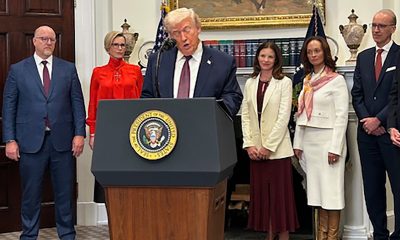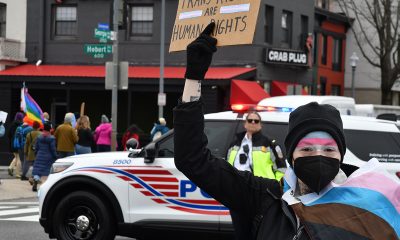National
Judge refuses to dismiss bias case against Library of Congress
Lawsuit claims fired gay employee protected under U.S. Civil Rights Act
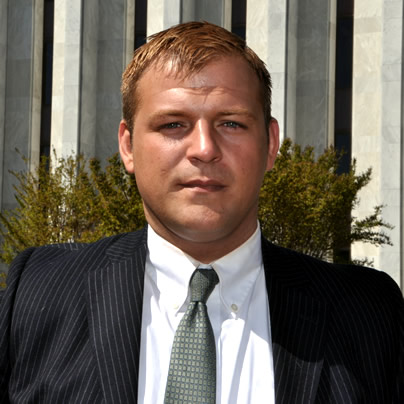
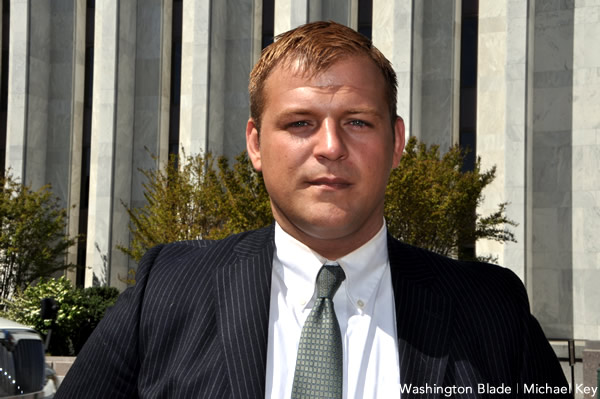
Peter TerVeer was allegedly subjected to harassment based on his sexual orientation while working at the Library of Congress. (Washington Blade file photo by Michael Key)
A federal judge on March 31 ruled that a gay man who sued the Library of Congress for firing him in 2012 because of his sexual orientation has legal standing to claim he’s entitled to protection under Title VII of the U.S. Civil Rights Act of 1964.
In a 34-page opinion, U.S. District Court Judge Colleen Kollar-Kotelly denied a motion by the U.S. Attorney for D.C. that the discrimination lawsuit filed by former Library of Congress management analyst Peter TerVeer should be dismissed on summary judgment.
Kollar-Kotelly rejected the U.S. Attorney’s assertion that TerVeer failed to show he has standing to pursue his claim that he’s covered under the U.S. Civil Rights Act on grounds that he was subjected to illegal sex discrimination based on gender stereotyping as a gay man.
In a split ruling, Kollar-Kotelly granted the U.S. Attorney’s request to dismiss other claims by the lawsuit that the Library of Congress violated TerVeer’s constitutional rights as well as violated Library of Congress regulations and policies.
But according to TerVeer’s attorney, Christopher Brown of the D.C. law firm Ackerman Brown, the ruling upholding TerVeer’s ability to move ahead to trial on the Title VII grounds is an important development for gay rights.
“We are pleased that we will have the opportunity to develop these claims and present them in court,” Brown told the Blade. “In my opinion this represents movement forward for the LGBT community bringing us one large step closer to equal treatment under Title VII.”
He noted that had Kollar-Kotelly dismissed the lawsuit’s claim seeking redress under Title VII, as the U.S. Attorney had urged, the opportunity to push for Title VII protection for gay people would have been lost in this case.
Title VII of the famed 1964 Civil Rights Act bans discrimination based on race, religion, ethnicity, gender, and, according to recent court rulings, gender identity, but not sexual orientation by itself.
With legislation calling for banning job discrimination based on sexual orientation and gender identity stalled in Congress, gay rights attorneys have argued in cases similar to TerVeer’s that lesbians and gay men are covered under Title VII. The attorneys, including those with Lambda Legal, claim that anti-gay discrimination is based on sex discrimination – which is covered under Title VII – because its perpetrators perceive gay people as not conforming to traditional gender roles.
In prior decisions, federal courts have ruled that transgender people are covered under Title VII’s prohibitions against sex discrimination.
In his lawsuit, TerVeer charges that he was fired after being harassed and humiliated by a supervisor who repeatedly quoted biblical passages condemning homosexuality.
The lawsuit says although TerVeer was targeted because he’s gay, he encountered employment discrimination and harassment based on his gender, gender stereotyping and his religious beliefs, which he says didn’t conform to those of supervisor John Mech.
Mech and library officials have declined to comment on TerVeer’s allegations, saying they are bound by a Library of Congress policy of not discussing pending litigation.
Brown said the judge’s decision to grant the government’s motion to dismiss the constitutional and other legal claims by the lawsuit don’t pose a significant disadvantage to the case. He said those claims had been made as a backup in the event that the court dismissed the Title VII claims.
“As Plaintiff has alleged that Defendant denied him promotions and created a hostile work environment because of Plaintiff’s nonconformity with male sex stereotypes, Plaintiff has met his burden of settling forth ‘a short and plain statement of the claim showing that the pleader is entitled to relief’ as required by Federal Rule of Civil Procedure,” Kollar-Kotelly said in her ruling.
“Accordingly, the Court denies Defendant’s Motion to Dismiss Plaintiff’s sex discrimination claim (Count I) for failure to state a claim,” the judge stated in her ruling.
Federal Government
Holiday week brings setbacks for Trump-Vance trans agenda
Federal courts begin to deliver end-of-year responses to lawsuits involving federal transgender healthcare policy.

While many Americans took the week of Christmas to rest and relax, LGBTQ politics in the U.S. continued to shift. This week’s short recap of federal updates highlights two major blows to the Trump-Vance administration’s efforts to restrict gender-affirming care for minors.
19 states sue RFK Jr. to end gender-affirming care ban
New York Attorney General Letitia James announced on Tuesday that the NYAG’s office, along with 18 other states (and the District of Columbia), filed a lawsuit to stop U.S. Health and Human Services (HHS) Secretary Robert F. Kennedy Jr. from restricting gender-affirming care for minors.
In the press release, Attorney General James stressed that the push by the Trump-Vance administration’s crusade against the transgender community — specifically transgender youth — is a “clear overreach by the federal government” and relies on conservative and medically unvalidated practices to “punish providers who adhere to well-established, evidence-based care” that support gender-affirming care.
“At the core of this so-called declaration are real people: young people who need care, parents trying to support their children, and doctors who are simply following the best medical evidence available,” said Attorney General James. “Secretary Kennedy cannot unilaterally change medical standards by posting a document online, and no one should lose access to medically necessary health care because their federal government tried to interfere in decisions that belong in doctors’ offices. My office will always stand up for New Yorkers’ health, dignity, and right to make medical decisions free from intimidation.”
The lawsuit is a direct response to HHS’ Dec. 18 announcement that it will pursue regulatory changes that would make gender-affirming health care for transgender children more difficult, if not impossible, to access. It would also restrict federal funding for any hospital that does not comply with the directive. KFF, an independent source for health policy research, polling, and journalism, found that in 2023 federal funding covered nearly 45% of total spending on hospital care in the U.S.
The HHS directive stems directly from President Donald Trump’s Jan. 28 Executive Order, Protecting Children From Chemical and Surgical Mutilation, which formally establishes U.S. opposition to gender-affirming care and pledges to end federal funding for such treatments.
The American Medical Association, the nation’s largest and most influential physician organization, has repeatedly opposed measures like the one pushed by President Trump’s administration that restrict access to trans health care.
“The AMA supports public and private health insurance coverage for treatment of gender dysphoria and opposes the denial of health insurance based on sexual orientation or gender identity,” a statement on the AMA’s website reads. “Improving access to gender-affirming care is an important means of improving health outcomes for the transgender population.”
The lawsuit also names Oregon, Washington, California, Colorado, Connecticut, Delaware, the District of Columbia, Illinois, Maine, Maryland, Massachusetts, Michigan, Minnesota, New Mexico, Pennsylvania, Rhode Island, Vermont, and Wisconsin as having joined New York in the push against restricting gender-affirming care.
At the HHS news conference last Thursday, Jim O’Neill, deputy secretary of the department, asserted, “Men are men. Men can never become women. Women are women. Women can never become men.”
DOJ stopped from gaining health care records of trans youth
U.S. District Judge Cathy Bissoon blocked an attempt by the Department of Justice (DOJ) to gain “personally identifiable information about those minor transgender patients” from the University of Pittsburgh Medical Center (UPMC), saying the DOJ’s efforts “fly in the face of the Supreme Court.”
Journalist Chris Geidner originally reported the news on Dec. 25, highlighting that the Western District of Pennsylvania judge’s decision is a major blow to the Trump-Vance administration’s agenda to curtail transgender rights.
“[T]his Court joins the others in finding that the government’s demand for deeply private and personal patient information carries more than a whiff of ill intent,” Bissoon wrote in her ruling. “This is apparent from its rhetoric.”
Bissoon cited the DOJ’s “incendiary characterization” of trans youth care on the DOJ website as proof, which calls the practice politically motivated rather than medically sound and seeks to “…mutilate children in the service of a warped ideology.” This is despite the fact that a majority of gender-affirming care has nothing to do with surgery.
In United States v. Skrmetti, the Supreme Court ruled along party lines that states — namely Tennessee — have the right to pass legislation that can prohibit certain medical treatments for transgender minors, saying the law is not subject to heightened scrutiny under the Equal Protection Clause of the Fourteenth Amendment because it does not involve suspect categories like race, national origin, alienage, and religion, which would require the government to show the law serves a compelling interest and is narrowly tailored, sending decision-making power back to the states.
“The government cannot pick and choose the aspects of Skrmetti to honor, and which to ignore,” Judge Bissoon added.
The government argued unsuccessfully that the parents of the children whose records would have been made available to the DOJ “lacked standing” because the subpoena was directed at UPMC and that they did not respond in a timely manner. Bissoon rejected the timeliness argument in particular as “disingenuous.”
Bissoon, who was nominated to the bench by then-President Obama, is at least the fourth judge to reject the DOJ’s attempted intrusion into the health care of trans youth according to Geidner.
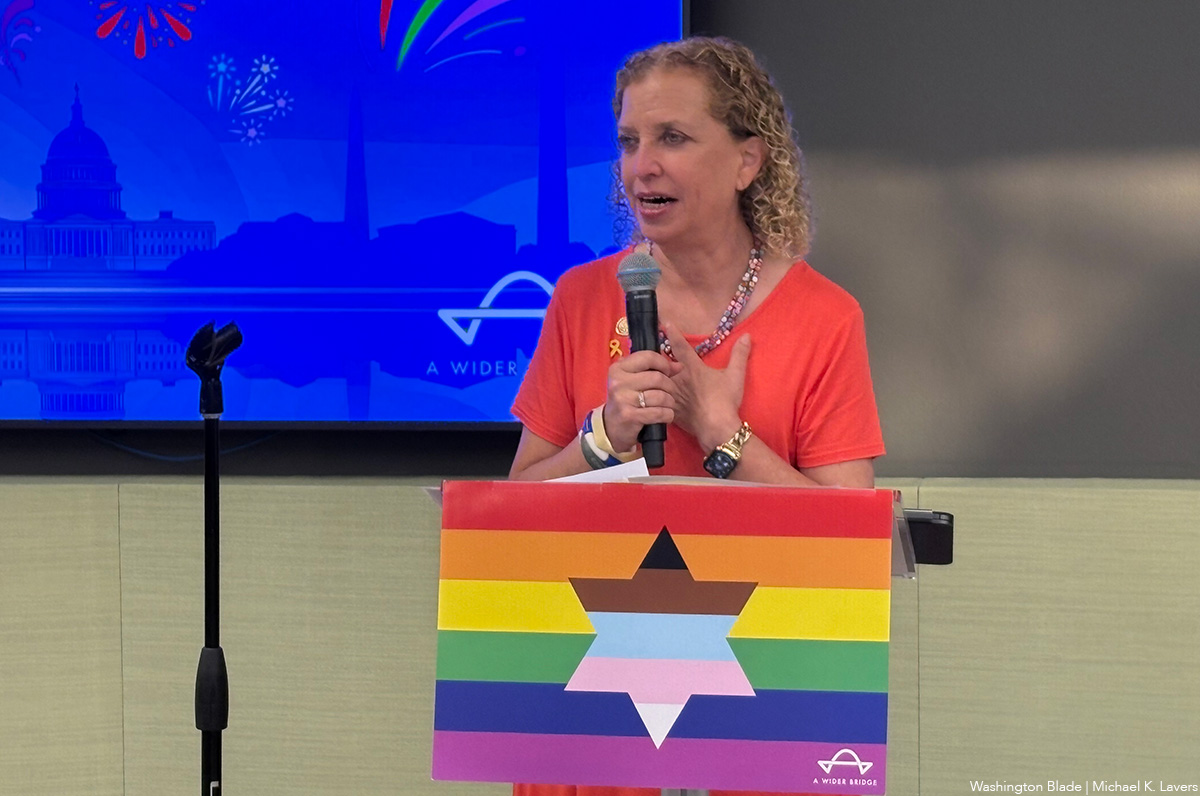
A Wider Bridge on Friday announced it will shut down at the end of the month.
The group that “mobilizes the LGBTQ community to fight antisemitism and support Israel and its LGBTQ community” in a letter to supporters said financial challenges prompted the decision.
“After 15 years of building bridges between LGBTQ communities in North America and Israel, A Wider Bridge has made the difficult decision to wind down operations as of Dec. 31, 2025,” it reads.
“This decision comes after challenging financial realities despite our best efforts to secure sustainable funding. We deeply appreciate our supporters and partners who made this work possible.”
Arthur Slepian founded A Wider Bridge in 2010.
The organization in 2016 organized a reception at the National LGBTQ Task Force’s Creating Change Conference in Chicago that was to have featured to Israeli activists. More than 200 people who protested against A Wider Bridge forced the event’s cancellation.
A Wider Bridge in 2024 urged the Capital Pride Alliance and other Pride organizers to ensure Jewish people can safely participate in their events in response to an increase in antisemitic attacks after Hamas militants attacked Israel on Oct. 7, 2023.
The Jewish Telegraphic Agency reported authorities in Vermont late last year charged Ethan Felson, who was A Wider Bridge’s then-executive director, with lewd and lascivious conduct after alleged sexual misconduct against a museum employee. Rabbi Denise Eger succeeded Felson as A Wider Bridge’s interim executive director.
A Wider Bridge in June honored U.S. Rep. Debbie Wasserman Schultz (D-Fla.) at its Pride event that took place at the Capital Jewish Museum in D.C. The event took place 15 days after a gunman killed two Israeli Embassy employees — Yaron Lischinsky and Sarah Milgrim — as they were leaving an event at the museum.
“Though we are winding down, this is not a time to back down. We recognize the deep importance of our mission and work amid attacks on Jewish people and LGBTQ people – and LGBTQ Jews at the intersection,” said A Wider Bridge in its letter. “Our board members remain committed to showing up in their individual capacities to represent queer Jews across diverse spaces — and we know our partners and supporters will continue to do the same.”
Editor’s note: Washington Blade International News Editor Michael K. Lavers traveled to Israel and Palestine with A Wider Bridge in 2016.
The White House
‘Trump Rx’ plan includes sharp cuts to HIV drug prices
President made announcement on Friday

President Donald Trump met with leaders from some of the world’s largest pharmaceutical companies at the White House on Friday to announce his new “Trump Rx” plan and outline efforts to reduce medication costs for Americans.
During the roughly 47-minute meeting in the Roosevelt Room, Trump detailed his administration’s efforts to cut prescription drug prices and make medications more affordable for U.S. patients.
“Starting next year, American drug prices will come down fast, furious, and will soon be among the lowest in the developed world,” Trump said during the meeting. “For decades, Americans have been forced to pay the highest prices in the world for prescription drugs by far … We will get the lowest price of anyone in the world.”
Trump signed an executive order in May directing his administration “to do everything in its power to slash prescription drug prices for Americans while getting other countries to pay more.”
“This represents the greatest victory for patient affordability in the history of American health care, by far, and every single American will benefit,” he added.
Several pharmaceutical executives stood behind the president during the announcement, including Sanofi CEO Paul Hudson, Novartis CEO Vas Narasimhan, Genentech CEO Ashley Magargee, Boehringer Ingelheim (USA) CEO Jean-Michel Boers, Gilead Sciences CEO Dan O’Day, Bristol Myers Squibb General Counsel Cari Gallman, GSK CEO Emma Walmsley, Merck CEO Robert Davis, and Amgen Executive Vice President Peter Griffith.
Also in attendance were Health and Human Services Secretary Robert F. Kennedy Jr., Commerce Secretary Howard Lutnick, Centers for Medicare and Medicaid Services Administrator Mehmet Oz, and Food and Drug Administration Commissioner Marty Makary.
Under the Trump Rx plan, the administration outlined a series of proposed drug price changes across multiple companies and therapeutic areas. Among them were reductions for Amgen’s cholesterol-lowering drug repatha from $573 to $239; Bristol Myers Squibb’s HIV medication reyataz from $1,449 to $217; Boehringer Ingelheim’s type 2 diabetes medication jentadueto from $525 to $55; Genentech’s flu medication xofluza from $168 to $50; and Gilead Sciences’ hepatitis C medication epclusa from $24,920 to $2,425.
Additional reductions included several GSK inhalers — such as the asthma inhaler advair diskus 500/50, from $265 to $89 — Merck’s diabetes medication januvia from $330 to $100, Novartis’ multiple sclerosis medication mayzent from $9,987 to $1,137, and Sanofi’s blood thinner plavix from $756 to $16. Sanofi insulin products would also be capped at $35 per month’s supply.
These prices, however, would only be available to patients who purchase medications directly through TrumpRx. According to the program’s website, TrumpRx “connects patients directly with the best prices, increasing transparency, and cutting out costly third-party markups.”
Kennedy spoke after Trump, thanking the president for efforts to lower pharmaceutical costs in the U.S., where evidence has shown that drug prices — including both brand-name and generic medications — are nearly 2.78 times higher than prices in comparable countries. According to the Pharmaceutical Research and Manufacturers of America, roughly half of every dollar spent on brand-name drugs goes to entities that play no role in their research, development, or manufacturing.
“This is affordability in action,” Kennedy said. “We are reversing that trend and making sure that Americans can afford to get the life-saving solutions.”
Gilead CEO Dan O’Day also spoke about how the restructuring of drug costs under TrumpRx, combined with emerging technologies, could help reduce HIV transmission — a virus that, if untreated, can progress to AIDS. The LGBTQ community remains disproportionately affected by HIV.
“Thank you, Mr. President — you and the administration,” O’Day said. “I think this objective of achieving the commitment to affordability and future innovation is extraordinary … We just recently launched a new medicine that’s only given twice a year to prevent HIV, and we’re working with Secretary Kennedy and his entire team, as well as the State Department, as a part of your strategy to support ending the epidemic during your term.
“I’ve never been more optimistic about the innovation that exists across these companies and the impact this could have on America’s health and economy,” he added.
Trump interjected, asking, “And that’s working well with HIV?”
“Yes,” O’Day replied.
“It’s a big event,” Trump said.
“It literally prevents HIV almost 100 percent given twice a year,” O’Day responded.
A similar anti-HIV medication is currently prescribed more than injectable form mentioned by O’Day. PrEP, is a medication regimen proven to significantly reduce HIV infection rates for people at high risk. Without insurance, brand-name Truvada can cost roughly $2,000 per month, while a generic version costs about $60 per month.
Even when medication prices are reduced, PrEP access carries additional costs, including clinic and laboratory fees, office visits, required HIV and sexually transmitted infection testing, adherence services and counseling, and outreach to potentially eligible patients and providers.
According to a 2022 study, the annual total cost per person for PrEP — including medication and required clinical and laboratory monitoring — is approximately $12,000 to $13,000 per year.
The TrumpRx federal platform website is now live at TrumpRx.gov, but the program is not slated to begin offering reduced drug prices until January.



